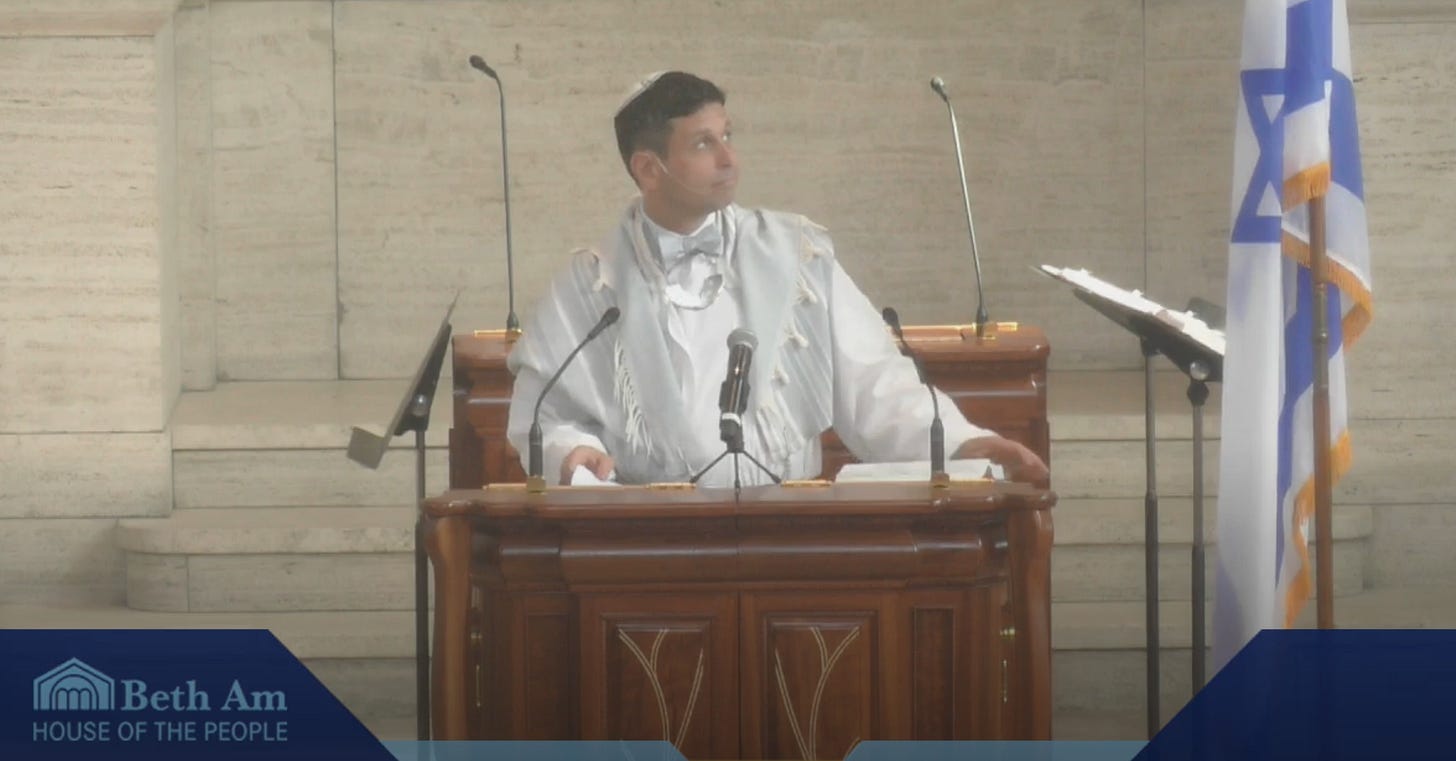Rosh Hashanah Day 1 SERMON for 5786, delivered at Beth Am Synagogue in Baltimore on Sept. 23, 2025.
What’s the difference between a Jewish pessimist and a Jewish optimist? The Jewish pessimist says, “things just can’t get any worse.” The Jewish optimist says, “oh yes, they can.”
This past May I celebrated twenty years in the rabbinate. The last ten, like the first ten, have been immensely rewarding. But they have also been quite hard. Yes, for rabbis, but also for Jews, for Americans, for African Americans, for Israelis, for Palestinians, for women, for LGBTQ folks, for Latinos, for immigrants, for city-dwellers who love their cities, for humans, and other humans, and more humans. For those who believe in the principles of democracy, in the rule of law, in science, in medicine, in journalism, in political discourse without political violence, in higher education, in public education, in expertise, in Truth. I could go on.
I will go on (because I’m an optimist). Fred Rogers, the first person to teach me about the importance of neighborhoods, liked to quote historian Will Durant who once described civilization as “a stream with banks. The stream is sometimes filled with blood from people killing, stealing, shouting, and doing things historians usually record – while, on the banks, unnoticed, people build homes, make love, raise children, sing songs, write poetry, whittle statues. The story of civilization is the story of what happens on the banks” (The World According to Mr. Rogers, P. 161). Historians, Durant felt, focus too much on the story of the stream and not enough on its banks. But what to do when we find ourselves in the midst of a bloody river, when the goings on of our civilizations are not fragments of history, passionless on the page, but swirling eddies, gushing rapids threatening to drown anything that floats? What to do when the killing, stealing, and shouting, bursts through dams, overflows the banks, laps against homes and threatens the lives of the people who raise those children, sing those songs, write that poetry? When the cautionary tales of history become our lived experience, how can we simply come to shul and proclaim L’shana tova!
In fact, I think we must. I think the only authentic Jewish response to chaos and cruelty is not the naivete of “it can’t get worse.” Nor the cynicism and fatalism of “oh, yes it can.” No, to be a Jew in this moment is to channel the spirit of this day. Rosh Hashanah positions us on a threshold between past and future. It calls us to retrospection and repair of past harms even as our gaze is fixed on the new year. It is Yom HaZikaron, day of remembrance, Yom HaDin, day of judgment, and Yom Teruah, day of proclamatory blasts. Rosh Hashanah is a “yes, and” holiday. Yes, new year. Yes, last year. Yes, start over. Yes, still work to do before Yom Kippur. Yes, new foods and new experiences. Yes, promise. Yes, pain. Yes…and….
Raise your hand if you’ve done improv comedy? How about attended an improv show? Years ago, Kelley Gludt brought an improv instructor to one of our synagogue Shabbatonim. What I most remember, aside from the laughter and fun, was the approach. A pillar of improvisational comedy is the rule of “yes, and.” In a 2016 interview from The Atlantic, Julie Brister, longtime instructor at Upright Citizens Brigade, one the country’s most well-known improv groups, had this to say about the virtue of “yes.” “In improv,” she said, “you’re supposed to accept and embrace another person’s idea. Not necessarily their point of view, but their idea—you’re supposed to say ‘yes’ to that….”
It’s often silly, sometimes hilarious, sometimes just fantastical. But in contrast to blocking an idea with “no,” the approach invites your partner into a collaborative and additive conversation. But here’s the thing, here’s what I want to suggest in considering the “yes, and” of Rosh Hashanah and of our civilizational moment. The word “no” isn’t really the problem. Disagreement happens all the time. “No” in the right context creates necessary boundaries. The real problem I want to address today is the tendency to say “yes…but.” This move has become so prevalent, the phenomenon even has a name: whataboutism.
“Hey Honey, you forgot to take out the trash.”
“Thanks Hon, but what about the dishes you left in the sink?”
Or…
“The slaying of Charlie Kirk was appalling. Political violence is a scourge and should never be condoned.
“Yes, but Charlie Kirk made vile comments and had repugnant views.
Or… [Positioning Israeli Flag in Center of Bima]
Person 1: “October 7 was devasting for the Jewish people. To think that 1200 women, men, and children were violated, brutalized, and slaughtered like animals! That 251 people, including children, a 9-mo-old baby and the elderly, were stolen from their homes and held in the tunnels. That scores were starved and killed, including that baby. That dozens remain 718 days later. It’s just unimaginable!”
Person 2: “Yes, but what about children in Gaza killed by Israeli bombs?
Or reverse it
Person 1: “Can you believe the extent of the suffering in Gaza? Tens of thousands dead? Palestinians starving? Lack of electricity or clean water. The sheer level of destruction!”
Person 2: “Yes, but what about Hamas? Israel didn’t start this war. Hamas did. They brought this on themselves!”
“Yes, but.” “Yes, and.” “Yes, but” minimizes the statement that came first. “Yes, and” honors it. Julie Brister, the improv teacher, says “yes, and” thinking has benefits well beyond the stage: “Listening… is the number one thing…, listening and hearing what the other person is saying. Then building off of that rather than waiting for someone to stop talking so you can say your thing. That’s the hardest thing to learn as an improviser — it’s to listen. And I think that’s one of the hardest things to do as a person. Listen, and use what’s being said rather than “oh are you done yet?” let me say what I’m going to say.”
I know Jews, as I know non-Jews, who are not so good at this, who think a conversation has two parts: talking and waiting. But the Jewish people and our textual heritage have a deep appreciation for the “and.” We have always stood for the virtues of complexity, nuance, illuminating binaries. We are ancient and modern, of the shtetl and of the city, rooted in our history and forward thinking, facing Jerusalem when we pray from Haifa and Baltimore. This embrace of complexity, even paradox, is captured in a passage from the Babylonian Talmud (Eruvin 13b):
“Rabbi Abba said that Shmuel said: For three years Beit Shammai and Beit Hillel disagreed. These said: The halakha is in accordance with our opinion, and these said: The halakha is in accordance with our opinion. Ultimately, a Divine Voice emerged and proclaimed: Eilu v’eilu divrei Elohim Hayim, these and those are the words of the living God.” Even so, the practical ruling does go to the House of Hillel, but not necessarily because they were right on the merits. Why? Because they cited the opinions of Bet Shammai even before their own! Two contradictory things can be right. Even when we choose a victor, we need not diminish or disparage the other. Not every position is worthy of “yes, and” of course, but in many, many cases, even God is capacious enough for this and that.
Now, this in no way means Jewish tradition is averse to debate and disagreement. Mahloket L’Shem Shamayim, arguing for the sake of heaven, is a core principle. One fierce debate here within the American Jewish community with regard to Israel turns on what it means for Jews to exercise authority and power over others.
So, let’s start with our own perceptions. Take a look at this object. Really look at it. If it were not yuntif, I’d have you write this down, but for now just take a minute to react. What emotions does this object, this flag, bring up for you? Pride? Safety? Anger? Horror? Confusion? Fear? Sadness? Love? If you’re angry, at whom? If you’re afraid, of what? If you’re sad, why? So, now consider, what does this flag represent? If you were to give it a word, what would it be? Maybe it starts with a “Z”?
So, here’s what I want to say: This does not stand for Zionism. In 1898, when it was unveiled at the 2nd Zionist Congress, it stood for Zionism. Today, 77 years after 1948, it stands for the State of Israel, and the State of Israel stands for many things, some of them contradictory, some of them exquisitely beautiful, some of them quite ugly. But of all the things Israel is, it is not an idea. It is a country, a nation-state, a place with people, laws, cultures, food, historic and modern sites, beaches and mountains and wineries, VC startups, and top tier research universities. Its ground contains much of the history of our people, and the history of other religions: Christianity, Islam, Baha’i, Druze.
The story of Israel is the story of an ancient relationship between a people and a land. It’s the story of a man, a woman, a family who left the fertile crescent 4,000 years ago, beckoned by God to their new home. It’s the tale of a nation oppressed, enslaved, who loosed their bonds, returned to their land, and formed a kingdom. The State of Israel is rooted in an idea, an idea whispered on the lips of peasants and poets, doctors and dairymen, in homes and synagogues over millennia of exile. The 19th century’s rise of nationalism, and the 20th century’s very near extermination of European Jewry on the heels of centuries of discrimination, pogroms, rape, forced conscriptions, and murder, created space for this idea of Zionism to be realized in our ancestral homeland.
An idea helped give birth to the State of Israel, but the State of Israel is not an idea. And its flag, its stripes inspired by a tallit, its color the blue of the firmament, of the techelet on the tzitzit, is not an idea. It is a piece of cloth. We keep it on our bima to remind us of our land, our history, the promise of what it means for the Jewish people to control some small corner of this planet. And it stands for Israel’s responsibility, as with all nation-states, to wield its power for good, to respect its citizenry and all its inhabitants and protect them to the best of its ability. This flag is a symbol, but we keep it on the periphery, as we do with that other flag, because our gaze, our worship, is never to an object but toward a place, Jerusalem, our ancient capital, the same direction our people have been praying toward for thousands of years.
Since Oct. 7, the world and many of our own people have increasingly fallen into a debate over an idea called Zionism. If the State of Israel is behaving badly, if its government has abrogated the responsibilities delineated in its own Declaration of Independence, let’s talk about that. Arguing about Zionism, in my view, is a distraction.
Deep breath. I know. I’ve heard you. Surely not all of you, but some of you are struggling to fully access your love for Israel. I won’t ask for a show of hands, but I see you. The affection you have felt, the experiences you have had on previous trips, the memories of miracles of technology, of Israel’s survival and thriving, the food, culture, spiritual uplift you felt upon seeing the Kotel for the first time or climbing Masada or that first bite of a freshly made falafel at the shuk – these may be harder to call to mind when feeling enraged by images of rubble and starvation. Or perhaps your rage at Israel’s Prime Minister is because our hostages languish in captivity, and his motivations in this war are, at best, deeply suspect. Some of you are so angry or so embarrassed, you may even be struggling to access the grief we all felt at the horror of Oct. 7!
But my friends, please hear me when I say to be in relationship with Israel and the 7million of our people who live there, is to make a distinction between the founding ideology and the place. To love Israel is not to love Zionism, an idea, a word. I don’t love the idea of Miriam. If I were to sit with a couple and they said they were in love with the idea of each other, I would refer them to a therapist. Ideas matter of course. But debating ideas of ontology (whether Israel should exist) is a waste of time. Debate the epistemology (what do we know and how can we shape our understanding of it?) Or better yet, the axiology (what do Jewish ethics demand of a Jewish and democratic state and those who care about it?)
As Sarah Hurwitz, former speech writer for Barack Obama and lead speech writer for Hillary Clinton and Michelle Obama, writes (p. 204-5), “…Israelis have no desire to dissolve their state [and] it’s unlikely anyone can force them to do so. Yet, anti-Zionists make us spend countless hours on this pointless debate about whether or not Israel should be eliminated rather than how to address the actual conflict faced by actual people.”
These words appear in her provocative and compelling new book, As a Jew. Hurwitz worries, as I worry, that “whether” Israel not “how” Israel is beginning to dominate the discourse. And this thinking plays directly into the hands of those who wish for us and our interlocutors to ignore thousands of years of Jewish history and trauma, rootlessness through Christian hegemony, subordination to Islamic supremacy, the Jews who always lived in and the many more who prayed for return to Eretz Yisrael. Providing necessary context can be done without falling into the whataboutist trap. Do you know how many civilians died in WWII? Somewhere between 40 and 50 million. Civilian deaths are always tragic and, in many cases, can and should be avoided. And to speak of Israeli wars, including this one, without any context, argues Hurwitz, “would be like denouncing America for fighting in World War II…without ever mentioning Hitler or Pearl Harbor. There are legitimate critiques to be made of the Allies’ conduct in that war,” she says, “but ‘they killed millions of people for no reason whatsoever’ is not one of them.”
And there’s a more sinister subtext to much of the discourse about Zionism as an idea. The zero-sum argument of denying Jewish self-determination to enable Palestinian sovereignty can pretty easily slip into what Hurwitz (P. 199-200) and philosopher Bernard Harrison call “political antisemitism.” “Social antisemitism” views Jews as disgusting, inferior or untrustworthy. But political antisemitism, writes Harrison, “places the organized Jewish community causally at the heart of world affairs.” This kind of antisemitism, writes Hurwitz, relates to some grand moral project that “if completed, will result in the creation of an ideal society. But there is just one thing stopping this utopian project from succeeding: the Jews.” Here are some examples she sites: “We, early Christians are engaged in the grand moral project of Christianizing the Roman Empire… but those Jews refuse to convert. We, the communists, are working to bring about the brotherhood of man…but those capitalist Jews are stymying the revolution. We, the Germans, are trying to create a glorious Aryan nation… but those race-polluting Jews are out to destroy us. We, patriotic Americans, are trying to preserve our country’s heritage as a white, Christian nation… but those globalist Jews are replacing white people with Black and Brown immigrants. We, those who care about social justice, are trying to rid our world of racism and colonialism… but those Zionists insist on maintain their racist, colonialist country. If we could just defeat those Zionist Jews, then we could finally create the world as it should be.”
What word, what conjunction, appears again and again in the Hurwitz examples above? “But.” Antisemitism is the ultimate in “yes, but,” whataboutist thinking. Hevre, being Jewish and caring about Israel means avoiding the reductive and uplifting the generative. It means channeling our Jewish superpower – the gift of “yes, and” thinking. Israel is a democracy and Yariv Levine’s assault on its independent judiciary is deeply distressing. Israel must defend its borders against diabolical enemies like Hamas as would any country and its government is also partially to blame for the carnage of Oct. 7. How so? Israel’s intelligence failures, its payoffs to Hamas and Qatar, its sacrifice of peaceniks on kibbutzim in favor of protecting settlement expansion in the West Bank. And Hamas’s malevolent violence is, crucially, what carried out Oct. 7.
Yardena Schwartz’s illuminating and sobering Ghosts of a Holy War details the legacy of the Grand Mufti of Jerusalem from his instigation of the Hevron massacre of 1929 through his complicity with the Nazi regime, how he and his followers poisoned the well against Jews and Israelis for millions of Arabs and Palestinians, for generations to come. And she, like Hurwitz, also points out the ascendency of the Israeli Religious Right and its deleterious impact on those living under Israeli occupation. Netanyahu, Ben-Gvir, Smotrich, Katz – these people are dangerous and cruel, and elections are coming (Insha’Allah). And at some point, Palestinians will have to demonstrate through their own leadership, educational materials, and prioritization of investment dollars, they are prepared to live side-by-side, in peace, with the Jewish State of Israel.
Hevre, we must shore up the banks, not get swept away by the currents. Israel, the Jewish people, the Palestinians, these are not served by debating Jewish depravity, Jewish perfidy, who gets to claim the mantel of the “good Jews.” Inflammatory language like genocide and settler colonialism are not only factually wrong, they are also a distraction from important conversations we must be having about the future of Israel/Palestine. And while some people of good faith, including some in this very room, are having debates centered around these words and, I understand, doing so from a place of great pain and moral striving, make no mistake, these are the debates Hamas, Iran, the Houthis, Al Jazeera, Majorie Taylor Greene, want us to be having. Let’s not let haters of Jews and Judaism define us; let’s not allow those who willfully and vociferously deny our history or plot our destruction to dictate the rules for our discourse. Sometimes we need to say not “yes, and” but just “no.” And, naming the things we ought not say “yes” to will help focus us on the broad range of things we can and should.
To my knowledge, the word “but” doesn’t actually appear in Biblical Hebrew. “V” can imply “but.” Ach can imply “so”. But the thrust of the Tanakh’s language is additive not subtractive. The Rabbis did have language for the word “but,” but they were channeling foundational Jewish thought when they proclaimed: Eilu v’eilu, these and those, not these instead of those.
My friends, “Z” may stand for Zionism, but this flag stands for Israel. Did you know that “z” didn’t used to the end of the English alphabet? Kathryn Schultz, in her exquisite memoir Lost & Found, explains that for a long time, the final character of the English alphabet was not the letter “z” but the word “and” written as an ampersand. Its former status, she explains, is a covert acknowledgment of how easy we learn it and how much we need it. “Dozens of other words serve as conjunctions,” she writes, “but these words, among them yet, for, nor, after, although, unless, since, they qualify the relationship between two things being joined. Cause and effect…contrast or exception…contingency…. ‘And,’ she explains, does none of these things. It is a connection made of nothing but connection.”
So, this year, go make connections. Be curious. Try to say “and” more than “but” or “what about.” To the best of your ability, criticize people and policies and rhetoric for love of Israel. Donate to good causes. Fight for justice and inclusivity. Look for people who are engaged in serious conversations about plausible futures. Join those conversations. Visit Israel! These are truly the most optimistic things we can do when faced with our dire and distressing reality and the best way to channel all the “yeses” of Rosh Hashanah.











